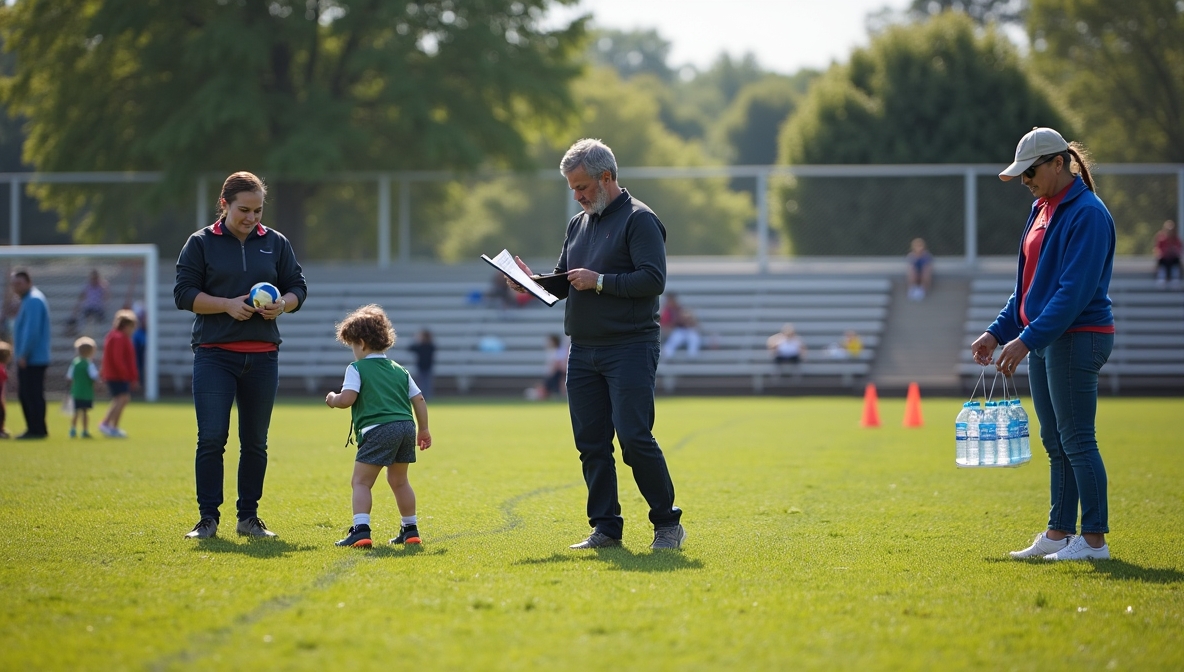Youth sports volunteer background checks are mandatory screening processes required by most youth athletic organizations to protect children from potential harm. Requirements vary significantly across different sports leagues and state regulations. This comprehensive guide covers sport-specific background check standards, state-by-state requirements, and practical implementation strategies for organizations managing volunteer screening programs in 2025.
Key Takeaways
- Youth sports volunteer background checks typically include criminal history searches, sex offender registry checks, and motor vehicle records for coaches who transport athletes.
- Little League requires all volunteers to complete national background checks through approved vendors, with screenings refreshed every two years for ongoing volunteers.
- Most youth sports organizations mandate background checks for anyone with regular unsupervised contact with minors, including coaches, assistant coaches, team managers, and transportation coordinators.
- Background check costs for youth sports volunteers range from $15 to $75 per screening depending on the search depth and whether fingerprint-based FBI checks are required.
- State laws in California, Pennsylvania, and New York have the strictest youth volunteer screening requirements, mandating multiple check types and fingerprint verification.
- AYSO, USYS, Pop Warner, and AAU each maintain distinct background check policies with varying lookback periods, disqualifying offenses, and renewal timelines.
- Organizations should implement clear written policies defining which volunteer roles require screening, disqualifying offenses, and appeal procedures to ensure consistency and legal compliance.
- Conditional approval processes allow volunteers to begin supervised participation while awaiting background check results, maintaining program operations without compromising child safety.
- Youth sports organizations must comply with FCRA regulations when using third-party screening companies, including providing proper disclosure and obtaining written consent before conducting checks.
Understanding Youth Sports Volunteer Background Checks
Youth sports volunteer background checks are systematic screening processes designed to identify individuals with criminal histories or behavioral patterns that could pose risks to children. These checks have become standard practice across youth athletic programs following increased awareness of child safety issues. Modern background screening for youth sports typically combines multiple database searches to create comprehensive risk assessments before allowing adults access to young athletes.
The fundamental purpose extends beyond simple criminal record searches. Organizations use these screenings to fulfill duty of care obligations, satisfy insurance requirements, and demonstrate good-faith efforts to maintain safe environments. Background checks serve as one layer within broader child protection frameworks that include training requirements, supervision policies, and reporting protocols. Most organizations require checks for volunteers in coaching roles, administrative positions with child access, and any function involving unsupervised contact with minors.
HereâÂÂs why I believe conducting background checks for volunteers is "Safeguarding Trust in its Purest Form": Trust is crucial to any organization involving youth, especially in youth sports, but I believe there is an underlying obligation to protecting "trust in its purest form" during these background checks for volunteers. Every parent, in delivering their child to practice, wonders instinctively, "Do I trust these adult figures on this playing field with my child's safety?" But I believe our process answers their unspoken question. These checks have nothing to do with trust, these checks have everything to do with "love in action," offering these youngsters a safe haven to learn, to play, to simply be adolescents once again. By taking these checks seriously, like any other employment, we pay tribute to not only these young players in our team, but to these genuine well-meaning volunteers seeking to function in these levels of safety, integrity, and responsibility.
Components of Standard Youth Sports Screenings
Standard youth sports volunteer background checks incorporate several distinct search types that together provide comprehensive risk assessment. The screening process typically includes these essential components:
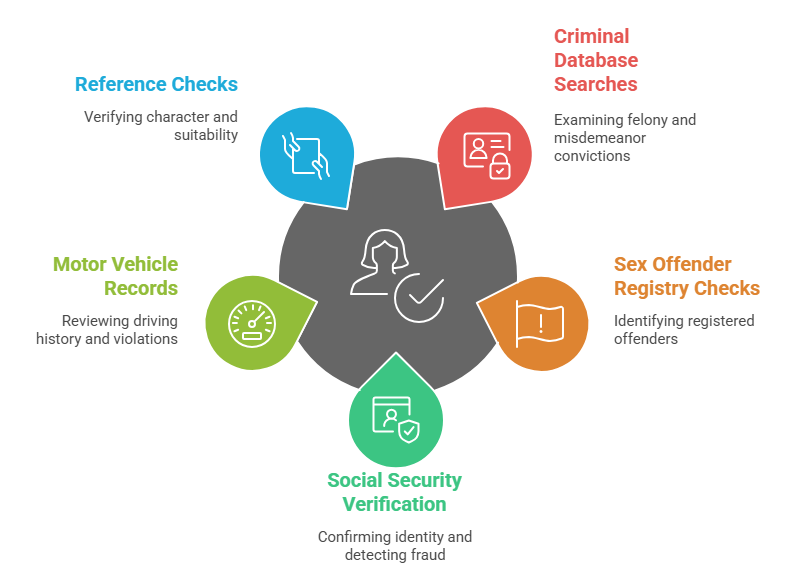
- Criminal Database Searches: County, state, and national records examining felony and misdemeanor convictions from relevant jurisdictions.
- Sex Offender Registry Checks: Federal and state database scans identifying registered offenders automatically disqualified from youth program participation.
- Social Security Verification: Identity confirmation detecting potential fraud or alias usage that could conceal problematic histories.
- Motor Vehicle Records: Driving history, license status, and traffic violations for volunteers who will transport athletes.
- Reference Checks: Structured interviews with previous supervisors verifying character and suitability for youth interaction roles.
Organizations determine which components to include based on risk assessment, budget constraints, and governing body requirements. Screening depth should correlate with volunteer access levels and organizational risk tolerance.
Legal Framework and Compliance Requirements
Federal law does not mandate youth sports volunteer background checks, but several state statutes require screening for adults working with minors in various capacities. Pennsylvania's Act 153 requires three separate clearances for volunteers with unsupervised contact with children. California Assembly Bill 506 mandates background checks for youth sports organizations receiving public funding or using public facilities. New York requires fingerprint-based background checks for certain youth program volunteers under Executive Law Section 837-f.
The Fair Credit Reporting Act (FCRA) governs how organizations conduct background checks when using third-party consumer reporting agencies. FCRA compliance includes these critical requirements:
- Provide clear written disclosure that background checks will be conducted
- Obtain separate written authorization from volunteers before screening
- Follow specific adverse action procedures if denying participation based on results
- Maintain proper documentation and secure storage of screening records
Violations can result in statutory damages up to $1,000 per violation plus actual damages and attorney fees. Beyond legal requirements, many organizations face contractual obligations from national governing bodies, insurance carriers, and facility operators.
Who Requires Background Screening
Background check requirements apply to various volunteer categories based on their interaction levels with young athletes. Head coaches universally require screening across all youth sports organizations. Assistant coaches similarly need clearance, even if they attend only some practices or games. Team managers who handle administrative duties, communicate with families, or attend team events also fall within screening requirements.
Other positions requiring background checks include:
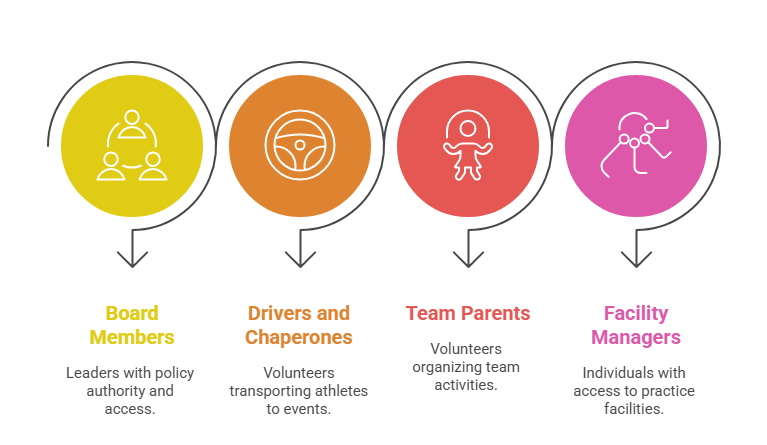
- Board Members and Officers: Organization leaders with policy-making authority and potential access to facilities and participant information.
- Drivers and Chaperones: Any volunteer transporting athletes to games, tournaments, or team events.
- Team Parents and Coordinators: Volunteers organizing team activities or managing communications involving child contact.
- Facility Managers: Individuals with keys or access credentials to practice facilities or areas where children may be present.
The general standard is that any volunteer with the opportunity for unsupervised or one-on-one contact with minors needs screening. Some organizations extend requirements to all volunteers attending team functions to ensure comprehensive coverage.
Sport-by-Sport Background Check Requirements
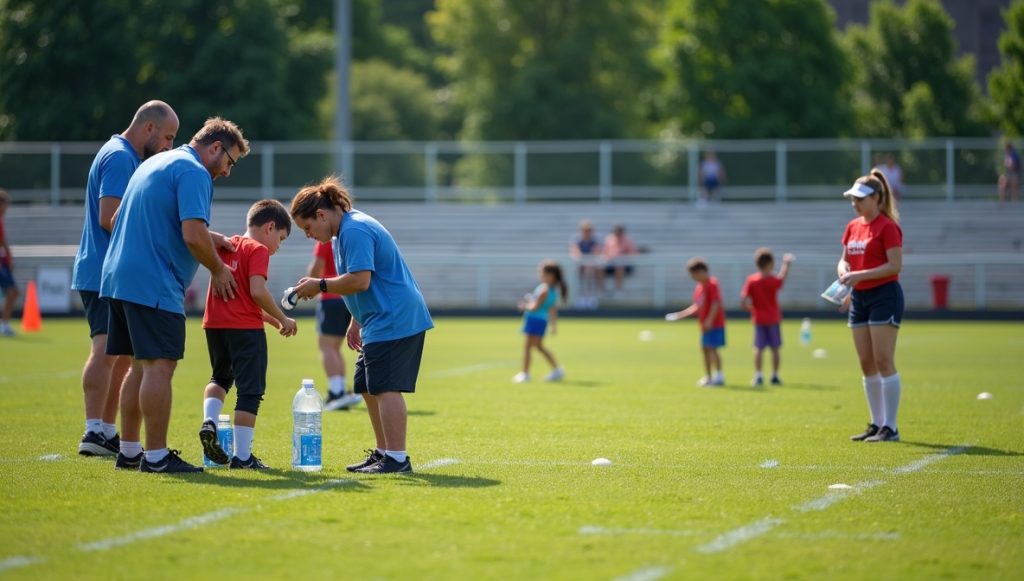
Youth sports organizations operate under governing bodies that establish specific background check standards for their affiliated programs nationwide. These requirements vary considerably across different sports, reflecting each organization's priorities, resources, and historical experiences with volunteer screening. National governing bodies typically mandate minimum standards that local affiliates must meet or exceed.
Little League Background Check Requirements
Little League International requires criminal background checks for all managers, coaches, Board of Directors members, and any other volunteers with repetitive access to or contact with players or teams. The organization partners with JDP Background Screening Services as its official provider, though leagues may use other FCRA-compliant vendors meeting Little League's minimum standards.
Background checks must search sex offender registries, criminal records at county and state levels for current residence and any location where the volunteer lived during the previous five years, plus national criminal database searches. Little League applies specific disqualification criteria based on offense type and severity:
| Offense Category | Disqualification Period |
| Crimes against children (abuse, exploitation, pornography) | Permanent |
| Sexual offenses (assault, battery, misconduct) | Permanent |
| Violent felonies (murder, kidnapping, assault) | Permanent |
| Drug-related felonies (trafficking, manufacturing) | Past 10 years |
| Theft or fraud felonies | Past 10 years |
Volunteers receiving adverse determinations may appeal to their local league's Board of Directors. Little League requires screening updates every two years for continuing volunteers. The organization provides leagues with implementation guides, sample policies, and volunteer communication templates.
AYSO Soccer Background Screening
American Youth Soccer Organization (AYSO) mandates background checks for all registered volunteers including coaches, team managers, division commissioners, board members, and anyone with regular contact with participants. AYSO partnered with Sterling Volunteers to provide integrated screening through the organization's registration system. The screening package includes national criminal database searches, sex offender registry checks across all 50 states, and county criminal searches for locations where volunteers have lived during the previous seven years.
AYSO applies a seven-year lookback period for most criminal offenses, examining convictions, pending charges, and deferred adjudications. Automatic disqualifications apply to any conviction involving crimes against minors, sexual offenses regardless of victim age, violent crimes, or drug distribution offenses. Lesser offenses trigger case-by-case review considering factors like offense date, number of incidents, and relevance to youth program participation. Background check results remain valid for two years from completion date.
Pop Warner Football and Cheer Screening
Pop Warner Little Scholars requires criminal background checks for all coaches, team moms, board members, and volunteers with regular team access across its football and cheer programs. The organization utilizes the National Center for Safety Initiatives (NCSI) as its official screening provider. Pop Warner's screening protocol includes nationwide criminal database searches, sex offender registry verification, and searches of county court records where volunteers have resided during the previous seven years.
Pop Warner maintains a strict policy automatically disqualifying volunteers with these convictions:
- Crimes against children, sexual offenses, violent felonies, or drug distribution crimes (permanent disqualification)
- Theft or fraud convictions within the past seven years
- DUI convictions within the past three years or two or more DUI offenses at any time
Unlike some organizations, Pop Warner does not permit local associations to grant exceptions to disqualifying offenses. Volunteers must complete updated background checks annually before each season. Associations must verify compliance before allowing participation.
AAU and Other Multi-Sport Organizations
Amateur Athletic Union (AAU) requires background checks for all coaches, assistant coaches, and non-athlete adults with regular access to AAU events or participants. AAU partners with NCSI to provide screening services integrated with membership registration. The screening examines criminal records, sex offender databases, and relevant civil court records. The organization's screening policy applies across all sports under the AAU umbrella.
AAU's background check policy automatically disqualifies individuals with felony or misdemeanor child abuse offenses, sexual misconduct crimes of any kind, violent crimes such as murder or kidnapping, and felony drug offenses involving distribution within the past ten years. AAU requires annual background check renewals for all covered individuals, with screening valid from August 1 through July 31 each membership year.
State-Specific Requirements and Variations
State laws governing youth volunteer background checks create additional compliance layers beyond national organization requirements. As of 2025, more than 30 states have enacted legislation addressing background screening for youth program volunteers. Specifics vary dramatically regarding scope, search requirements, and enforcement mechanisms. Organizations must understand both their state's mandates and requirements in states where they travel for competitions.
California Youth Volunteer Screening Laws
California Assembly Bill 506, enacted in 2018, requires youth sports organizations receiving public funding or using public facilities to conduct background checks on volunteers who work with minors. The law applies to parks and recreation programs, youth sports leagues using school or public fields, and nonprofit organizations receiving government grants or contracts.
AB 506 mandates specific screening components and operational standards:
- Background checks must search county criminal records for all counties where the volunteer resided during the past seven years, plus statewide criminal history databases
- Organizations must verify volunteers are not listed on the national sex offender registry or California's Megan's Law database
- Screening must be completed before volunteers begin working with minors, with limited provisional exceptions for supervised participation
- Organizations must maintain written screening policies, documentation of completed checks, and secure storage of records
California's law provides immunity from civil liability for organizations that conduct background checks in good faith. However, some California municipalities require additional screening elements or shorter lookback periods.
Pennsylvania's Comprehensive Clearance System
Pennsylvania's Act 153 establishes the nation's most comprehensive youth volunteer screening requirements, mandating three separate background clearances for adults with unsupervised contact with children. All volunteers must obtain a Pennsylvania State Police criminal history check, a Pennsylvania Department of Human Services child abuse history clearance, and an FBI criminal background check based on fingerprint submission.
The three-clearance system applies to youth sports volunteers regardless of whether the organization receives funding or uses public facilities. Pennsylvania law defines "volunteer" broadly to include anyone who provides care, supervision, guidance, or control of children through an organization. The FBI fingerprint check may be waived only for volunteers who have been continuous Pennsylvania residents for the previous ten years, though many organizations require all three clearances universally.
Pennsylvania mandates clearance renewals every 60 months for continuing volunteers. Organizations are responsible for tracking expiration dates. The state provides online portals for volunteers to request and pay for required clearances, with fee waivers available for unpaid volunteers.
State-by-State Comparison Overview
Background check requirements vary significantly across states with youth volunteer screening legislation. Understanding these differences is crucial for organizations operating multi-state programs or traveling across state lines for competitions.
| State | Mandatory Checks | Required Components | Lookback Period | Renewal Frequency |
| Pennsylvania | Yes - all volunteers | Criminal history (state), child abuse clearance, FBI fingerprint check | 10 years | Every 5 years |
| California | Yes - funded programs/public facilities | Criminal history (county + state), sex offender registry | 7 years | Every 2 years |
| New York | Yes - certain programs | Criminal history (state), national database search | 7 years | Every 3 years |
| Florida | Recommended with liability protection | Criminal history, sex offender registry | 10 years | Every 5 years |
| Texas | Yes - certain UIL activities | Criminal history, sex offender registry | Not specified | Not specified |
| Illinois | Yes - park districts/schools | Criminal history (state), sex offender registry | 7 years | Every 3 years |
Organizations operating in multiple states must comply with the most restrictive requirement applicable to their activities. Consulting with legal counsel familiar with state-specific requirements is advisable.
Background Check Process and Timeline
The youth sports volunteer background check process involves multiple steps from initial application through final clearance determination. Understanding the workflow helps organizations set realistic timelines, communicate expectations to volunteers, and plan around screening delays. Modern background check processes typically take three to 14 days depending on search depth, record availability, and whether manual courthouse research is required.
Step-by-Step Screening Process
The background check process begins when volunteers complete authorization forms granting permission for screening and providing necessary identifying information. Volunteers must supply their full legal name, any previous names or aliases, date of birth, Social Security number, and addresses for at least the past seven years. Most organizations now collect this information through secure online portals integrated with membership registration.
Once authorization is received, screening companies or organizational personnel initiate searches across relevant databases:
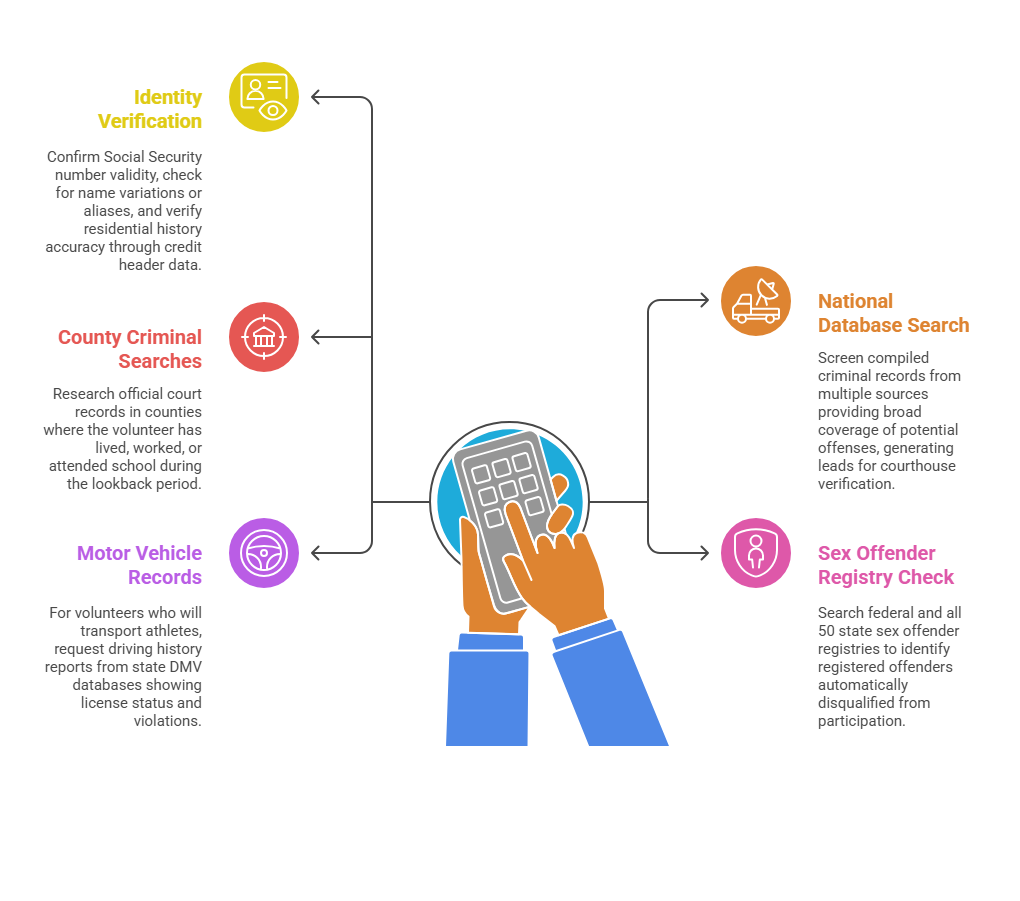
- Identity Verification: Confirm Social Security number validity, check for name variations or aliases, and verify residential history accuracy through credit header data.
- National Database Search: Screen compiled criminal records from multiple sources providing broad coverage of potential offenses, generating leads for courthouse verification.
- County Criminal Searches: Research official court records in counties where the volunteer has lived, worked, or attended school during the lookback period.
- Sex Offender Registry Check: Search federal and all 50 state sex offender registries to identify registered offenders automatically disqualified from participation.
- Motor Vehicle Records: For volunteers who will transport athletes, request driving history reports from state DMV databases showing license status and violations.
Results are compiled into comprehensive reports delivered to the organization through secure portals or encrypted email. Organizations review findings against their eligibility criteria, identifying disqualifying offenses or concerns requiring further investigation.
Typical Timelines and Turnaround
Standard youth sports volunteer background checks typically take five to seven business days from submission to final results when no complications arise. This timeframe assumes volunteers provide accurate information, required databases respond promptly, and no criminal records require courthouse verification. Organizations should plan for this standard timeline when establishing registration deadlines and season start dates.
Several factors can extend background check timelines beyond the typical range:
- County Courthouse Delays: Manual research at county courts may take 7 to 14 days depending on record accessibility and research request volume.
- Incomplete Volunteer Information: Missing or incorrect data requires follow-up communication, adding 2 to 5 days once corrected information is received.
- Name Discrepancies: Variations in records under different name spellings require additional verification, potentially adding 3 to 7 days.
- Out-of-State Searches: Volunteers with recent moves or residential history across multiple states face longer timelines.
Organizations should communicate realistic timelines to volunteers during registration, emphasizing the importance of prompt submission and accurate information. Many organizations establish registration deadlines 30 days before the season starts to accommodate screening timelines.
Conditional Approval Options
Some youth sports organizations implement conditional approval processes allowing volunteers to begin participation under supervision while awaiting background check results. This approach prevents screening delays from disrupting team formation or season start while maintaining child safety through enhanced oversight. Conditional approval works best for volunteers with no disclosed criminal history and positions where adequate supervision can be consistently maintained.
Organizations using conditional approval should establish clear written policies defining the parameters and limitations. Conditionally approved volunteers may attend practices and games but must remain under direct observation by fully cleared coaches or administrators at all times. These volunteers should not have one-on-one contact with athletes, access to locker rooms or private spaces, or transportation responsibilities until full clearance is confirmed. The conditional period should have a defined time limit, typically 14 to 21 days.
What Shows Up on Youth Volunteer Background Checks
Youth sports volunteer background checks reveal various record types that organizations evaluate against eligibility criteria to determine suitability for child interaction roles. Understanding what appears on screening reports helps volunteers anticipate results and organizations establish appropriate standards. The specific information revealed depends on the screening type, search jurisdiction, and state laws governing criminal record reporting.
Criminal History Records
Criminal history searches form the core component of youth volunteer background checks, revealing arrests, charges, convictions, and incarcerations from various jurisdictions and time periods. County criminal searches provide the most comprehensive criminal record information, showing detailed case information including offense descriptions, filing dates, dispositions, sentencing, and current case status.
Criminal records typically include these categories:
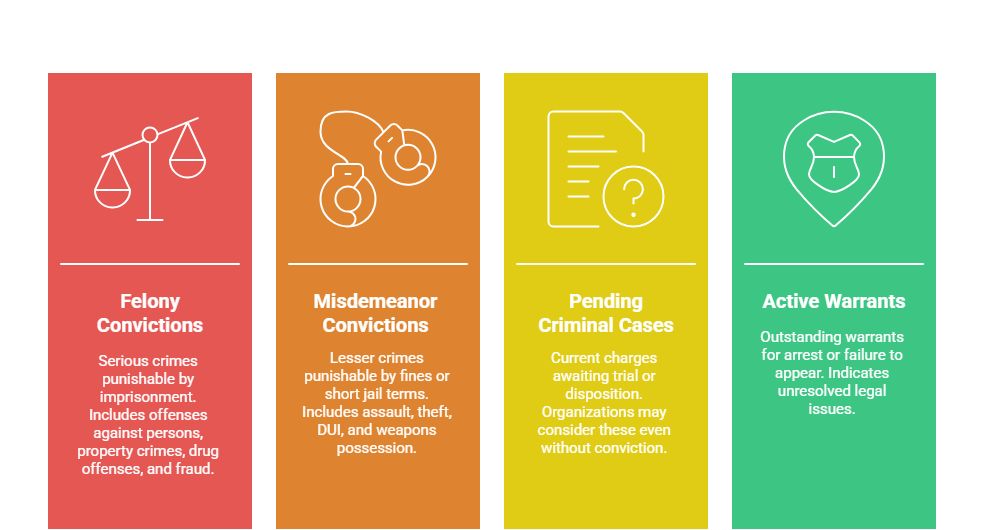
- Felony Convictions: Serious crimes punishable by more than one year imprisonment, including offenses against persons, property crimes, drug offenses, and fraud.
- Misdemeanor Convictions: Lesser crimes typically punishable by fines or jail terms under one year, including assault, theft, DUI, and weapons possession.
- Pending Criminal Cases: Current charges awaiting trial or disposition, which organizations may consider even without conviction.
- Active Warrants: Outstanding warrants for arrest or failure to appear indicating unresolved legal issues.
FCRA restricts reporting of criminal convictions older than seven years for most employment purposes. However, many states exempt volunteer positions involving children from these limitations. Organizations working with minors can typically access complete criminal histories without time restrictions.
Sex Offender Registry Checks
Sex offender registry checks search federal and state databases containing information about individuals convicted of sex offenses and required to register under Megan's Law provisions. These registries provide critical child safety information, as registered sex offenders are automatically disqualified from youth program participation. The National Sex Offender Public Website (NSOPW) aggregates data from all 50 states, territories, and tribal registries.
Registry listings typically include offender photographs, physical descriptions, residential addresses, offense details, and registration status. Registered offenses range from violent sexual assaults to statutory offenses involving minors to crimes like child pornography possession or distribution. Registration requirements vary by state and offense severity, with some offenders required to register for ten to 25 years while others face lifetime registration obligations.
Youth sports organizations should understand that sex offender registry checks capture only individuals convicted of qualifying offenses who completed their registration requirements. For this reason, sex offender checks supplement rather than replace criminal history searches.
Motor Vehicle Records and Additional Searches
Motor vehicle record (MVR) checks reveal driving history information essential for evaluating volunteers who will transport athletes to games, tournaments, or team events. State DMV databases provide comprehensive driving records including license status, restrictions or suspensions, traffic violations, accidents, and DUI convictions. Organizations should require MVR checks for any volunteer position involving athlete transportation.
| Record Type | Information Included | Typical Relevance Period |
| License Status | Valid, suspended, revoked, expired | Current status |
| Traffic Violations | Speeding, reckless driving, equipment violations | 3-7 years |
| DUI Convictions | Alcohol or drug-related driving offenses | 7-10 years |
| Accidents | At-fault and not-at-fault collision history | 3-5 years |
| License Class | Restrictions, endorsements, classifications | Current status |
Organizations should establish clear standards for acceptable driving records. Common standards include no DUI convictions within the past five years, no more than two moving violations within three years, and no at-fault accidents within the past two years.
Implementing Background Check Programs
Successful background check programs require thoughtful planning, clear policies, efficient processes, and ongoing administration to maintain compliance and effectiveness. Organizations transitioning from informal screening to structured programs face decisions about vendor selection, policy development, cost management, and communication strategies. Implementation timelines typically span three to six months from initial planning through full rollout.
Developing Organizational Policies
Comprehensive background check policies provide the foundation for effective implementation, establishing clear standards that ensure consistency, fairness, and legal compliance. Written policies should define which volunteer positions require screening, acceptable and disqualifying offenses, lookback periods, review procedures, and renewal requirements.
Essential policy components include:
- Scope Definition: Specific volunteer roles requiring background checks based on child access levels, distinguishing between positions needing comprehensive screening versus limited checks.
- Disqualifying Offenses: Clear lists of criminal convictions that automatically prohibit participation, such as crimes against children, sexual offenses, violent felonies, and drug distribution crimes.
- Reviewable Offenses: Secondary offense categories triggering case-by-case review, with factors considered including offense age, rehabilitation evidence, and relevance.
- Review Process: Procedures for evaluating concerning background check results, including who conducts reviews, what information is considered, and timelines for decisions.
- Appeal Rights: Volunteer rights to appeal adverse decisions, including submission of additional information, personal statements, and rehabilitation evidence.
- Confidentiality Standards: Requirements for secure storage, limited access, and proper disposal of background check records containing sensitive personal information.
Policies should be reviewed by legal counsel familiar with FCRA requirements, state laws, and youth organization liability issues before adoption. Board approval demonstrates organizational commitment and ensures volunteer screening receives necessary support and resources.
Vendor Selection and Cost Management
Choosing the right background screening vendor significantly impacts program efficiency, compliance, and cost-effectiveness. Youth sports organizations should evaluate potential vendors based on search comprehensiveness, turnaround times, pricing structures, technology integration capabilities, customer support quality, and FCRA compliance expertise.
Key vendor evaluation criteria include:
Search Quality: Comprehensive coverage of national databases, thorough county court searches in all relevant jurisdictions, and reliable sex offender registry checks across all 50 states with regular database updates.
Technology Platform: User-friendly volunteer portals for information submission, organizational dashboards for compliance tracking, automated renewal reminders, and integration capabilities with existing membership management systems.
Compliance Support: FCRA-compliant processes for disclosure, authorization, adverse action, and record retention, plus expert guidance for handling complex results and appeal procedures.
Pricing Structure: Transparent pricing without hidden fees, volume discounts for organizations with multiple affiliates, package options for different screening levels, and payment flexibility.
Background check costs vary based on search depth and geographic factors, typically ranging from $15 for basic national database checks to $75 for comprehensive packages. Organizations must decide whether to absorb screening costs as operational expenses or pass fees to volunteers.
Volunteer Communication Strategies
Effective communication ensures volunteers understand new requirements, appreciate child safety rationales, and complete screening processes promptly. Organizations should develop multi-channel communication plans addressing different volunteer segments including returning volunteers facing new requirements, first-time volunteers unfamiliar with screening processes, and parents questioning necessity.
Communication strategies should include:
- Advance Notice: Announce new background check requirements at least 60 to 90 days before implementation, providing time for questions and policy review.
- Rationale Explanation: Clearly articulate why background checks protect children, fulfill organizational obligations, and demonstrate community commitment to athlete safety.
- Process Instructions: Provide step-by-step guidance for completing background checks including where to access forms, what information is needed, how long screening takes, and what happens after submission.
- FAQ Documents: Address common volunteer concerns including who sees results, what happens to personal information, how long clearances remain valid, and what offenses cause disqualification.
- Support Resources: Establish help desk contacts for volunteers with questions or technical difficulties, provide troubleshooting guides, and offer assistance for volunteers lacking computer access.
Organizations should emphasize that background check requirements apply equally to all volunteers regardless of community standing or organizational history.
Handling Adverse Results and Appeals
Background check results revealing disqualifying or concerning information require careful handling to balance child safety priorities with fair treatment of volunteers. Organizations need clear procedures for reviewing adverse results, communicating decisions to affected volunteers, and managing appeals. These situations involve sensitive personal information, potential legal implications, and emotional responses requiring professionalism, confidentiality, and adherence to established policies.
Review Committee Procedures
Organizations should establish review committees to evaluate background check results that reveal potentially disqualifying information. These committees typically include board members, program administrators, and sometimes legal advisors who collectively assess whether specific findings warrant volunteer exclusion. Committee review provides multiple perspectives, reduces individual decision-making bias, documents deliberative processes, and demonstrates organizational diligence.
Review committees should follow structured evaluation processes considering relevant factors:
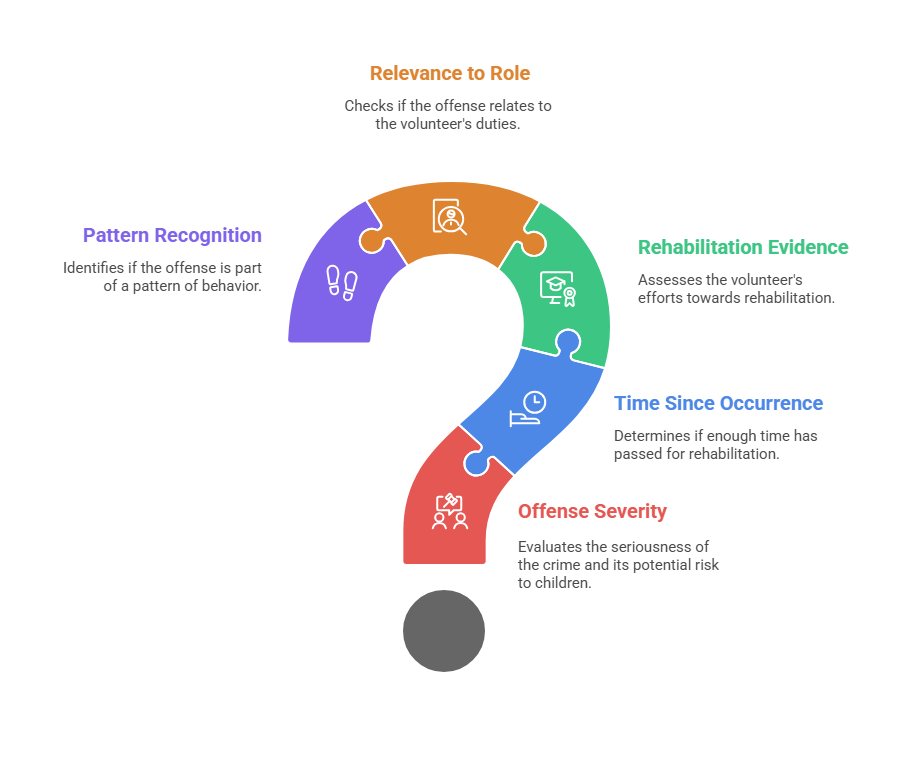
- Offense Nature and Severity: How serious was the crime, did it involve violence or victims, and does it indicate potential risk to children.
- Time Since Occurrence: How long ago did the offense occur, demonstrating whether sufficient time has passed for rehabilitation.
- Rehabilitation Evidence: Has the volunteer provided documentation of rehabilitation efforts such as counseling completion, community service, employment stability, or character references.
- Relevance to Volunteer Role: Does the offense relate to duties or child interaction aspects of the position being sought.
- Pattern Recognition: Was this an isolated incident or part of a pattern of similar behaviors suggesting ongoing risk.
Committee deliberations should be documented with written findings explaining the reasoning behind approval or denial decisions. Documentation protects organizations if decisions are later challenged legally or questioned by parents.
Communicating with Volunteers
Communicating adverse background check results to volunteers requires sensitivity, clarity, and FCRA compliance to protect volunteer rights while maintaining organizational authority. Organizations must provide proper notices at specific stages in the review process, giving volunteers opportunities to identify errors, explain circumstances, and provide additional context before final decisions.
The FCRA-compliant adverse action process includes these required steps:
- Pre-Adverse Action Notice: When background check results may lead to denial, provide the volunteer with a copy of the background check report and a written explanation of FCRA rights before making a final decision.
- Reasonable Waiting Period: Allow at least five business days for the volunteer to review the report, identify errors, and provide explanatory information.
- Review of Volunteer Response: Consider any information the volunteer provides including error corrections, context explanations, or rehabilitation evidence.
- Final Adverse Action Notice: If denial proceeds after review, provide written notice stating the decision, identifying the screening company, and explaining volunteer rights.
Communications should avoid unnecessary detail about specific criminal offenses that are not relevant to explaining the decision. Staff handling these communications need training on confidentiality requirements and appropriate language.
Managing Appeals and Exceptions
Organizations should establish formal appeal processes allowing volunteers to challenge adverse background check decisions or request exceptions based on mitigating circumstances. Clear appeal procedures demonstrate fairness, provide mechanisms for correcting errors, and ensure consistency across similar cases. However, organizations should rarely grant exceptions for serious offenses like crimes against children or sexual offenses.
Appeal processes typically include:
- Written Appeal Submission: Volunteers must submit written appeals within specified timeframes, typically 14 to 30 days after receiving adverse action notices.
- Additional Information: Appeals should include supporting documentation such as court records showing incorrect information, evidence of rehabilitation, character references, or explanations of circumstances.
- Appeals Committee Review: A separate committee or the original review committee reconvenes to evaluate appeal submissions, considering new information alongside original results.
- Final Determination: Appeals committees issue written decisions that are final, explaining whether appeals are granted or denied based on information presented.
Organizations granting exceptions should document extensive justification including specific mitigating factors, risk mitigation measures, time-limited approval terms, and unanimous committee agreement. Parents should be notified when volunteers with criminal histories receive exceptions.
Best Practices and Template Resources
Implementing effective youth sports volunteer background check programs requires more than basic compliance with minimum standards. Leading organizations incorporate comprehensive best practices that maximize child safety, streamline administrative processes, and build volunteer and parent confidence. These practices reflect accumulated experience from youth organizations nationwide combined with child protection expertise from insurance carriers, legal advisors, and safety advocacy groups.
Comprehensive Safety Policy Templates
Complete safety policies extend beyond background checks to address volunteer conduct standards, supervision requirements, communication protocols, and response procedures for concerning situations. Template policies provide starting points that organizations customize to reflect their specific sports, facilities, and operational structures.
Essential policy elements include:
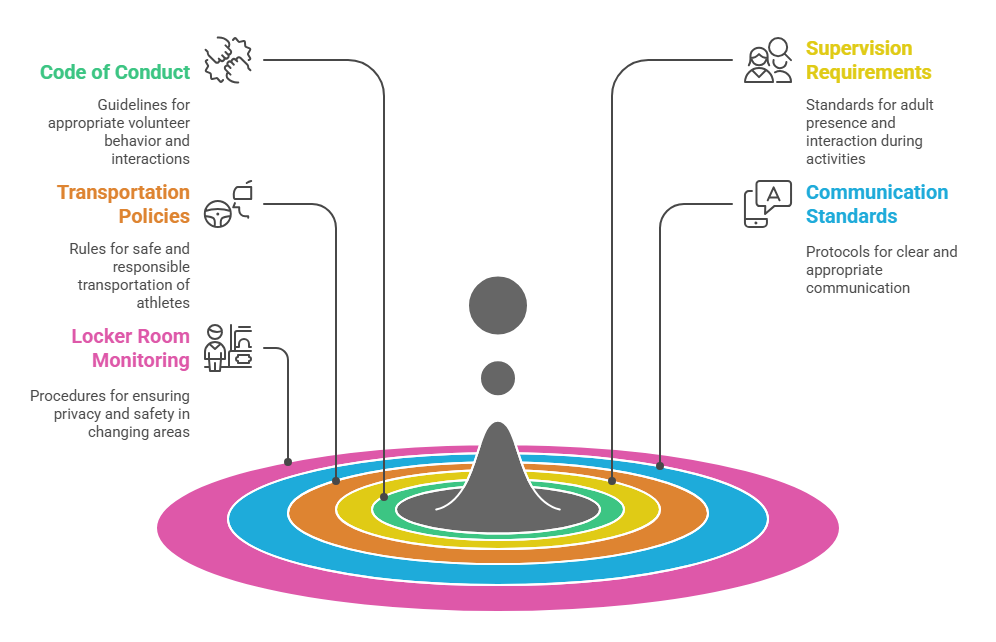
- Code of Conduct: Clear behavioral expectations for volunteers including appropriate interactions with athletes, prohibited conduct, professional boundaries with families, and social media interaction guidelines.
- Supervision Requirements: Standards requiring multiple adults present during practices and games, prohibited one-on-one contact in isolated locations, procedures for necessary individual discussions, and parent observation rights.
- Transportation Policies: Requirements for background checks including motor vehicle records, minimum age and experience standards for drivers, vehicle insurance requirements, passenger safety rules, and limitations on one-on-one transportation.
- Communication Standards: Guidelines for volunteer-athlete communications including approved methods, prohibited channels, parent copy requirements, and time restrictions.
- Locker Room Monitoring: Protocols for adult supervision in changing areas, procedures for ensuring privacy while maintaining oversight, and identification of situations requiring intervention.
Several national organizations provide template policies that youth sports programs can adapt. The U.S. Center for SafeSport offers comprehensive SafeSport policies. The Nonprofit Risk Management Center provides customizable screening policy templates. The National Council of Youth Sports publishes model policies addressing background screening, codes of conduct, and athlete safety.
Ongoing Monitoring and Renewal Systems
Background check programs require ongoing administration to maintain compliance as volunteers continue across multiple seasons and new volunteers join programs. Automated systems tracking clearance expiration dates, triggering renewal reminders, and preventing assignments of volunteers with expired screening prevent compliance gaps.
Effective monitoring systems should include:
| System Component | Function | Key Features |
| Centralized Database | Single repository containing all volunteer records | Background check completion dates, expiration dates, screening results summaries, renewal history |
| Automated Reminders | Email notifications sent to volunteers before expiration | Sent 60, 30, and 14 days before expiration with renewal instructions |
| Assignment Controls | Integration with team formation and scheduling systems | Prevent volunteers from receiving assignments when background checks are expired |
| Audit Reports | Regular compliance reports showing volunteer status | Identify individuals requiring immediate renewal action and flag non-compliance issues |
| Renewal Tracking | Documentation of renewal process | When notices were sent, when renewals completed, follow-up actions taken |
Organizations should establish clear policies that volunteers cannot participate in any program activities once background checks expire. Consistent enforcement prevents perceptions of favoritism and maintains program integrity.
Training and Education Programs
Background checks identify volunteers with problematic histories but do nothing to prepare cleared volunteers to recognize, prevent, or respond appropriately to child safety concerns. Comprehensive youth protection requires training programs educating volunteers about abuse warning signs, appropriate boundaries, reporting obligations, and organizational policies.
Recommended training components include:
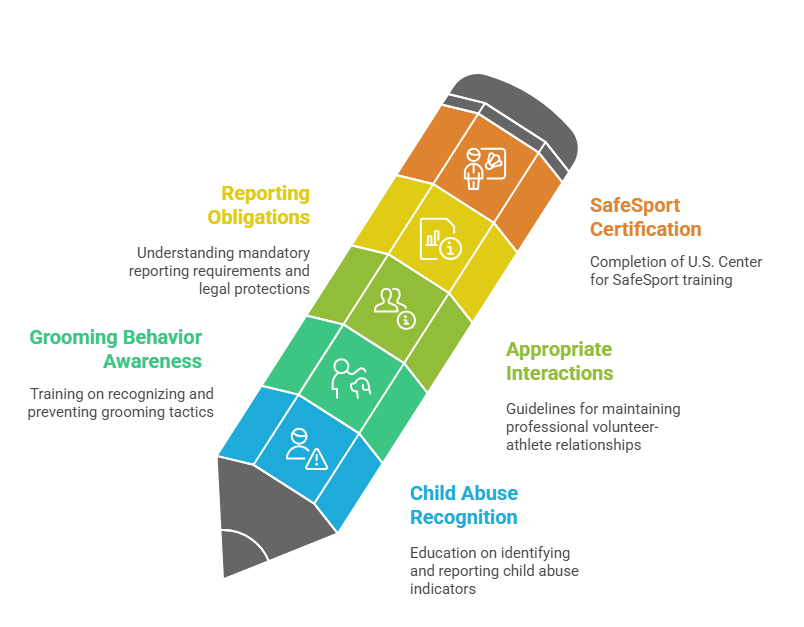
- Child Abuse Recognition: Education about physical abuse indicators, sexual abuse warning signs, emotional abuse patterns, and neglect symptoms that volunteers should report.
- Grooming Behavior Awareness: Training on how predators gradually build trust with victims and families, recognize boundary testing behaviors, and identify isolation tactics.
- Appropriate Interactions: Clear guidelines for professional volunteer-athlete relationships including touch policies, communication boundaries, private meeting protocols, and navigating situations requiring individual attention.
- Reporting Obligations: Training on mandatory reporting requirements including who must report suspicions, what threshold triggers reporting duties, where reports should be made, and legal protections.
- SafeSport Certification: Completion of U.S. Center for SafeSport training required for many national governing bodies, covering emotional and physical misconduct, sexual misconduct, bullying, and harassment prevention.
Organizations should require training completion before volunteers begin working with athletes, with refresher courses every two to three years. Training completion should be tracked alongside background check compliance.
Conclusion
Youth sports volunteer background checks have become essential child protection measures that responsible organizations implement regardless of legal mandates. These screenings, combined with comprehensive safety policies, ongoing monitoring, and volunteer training, create multi-layered protection frameworks. They minimize risks while maintaining the volunteer participation that makes youth sports possible. Organizations must navigate complex requirements varying across sports, states, and governing bodies while implementing sustainable processes. As youth sports continue evolving in 2025 and beyond, background screening will remain a non-negotiable foundation for programs committed to athlete safety and organizational integrity.
Frequently Asked Questions
Here are answers to some of the most common questions youth sports organizations and volunteers have about background checks. This FAQ is designed to simplify the basicsâÂÂwho needs to be screened, what disqualifies someone, how much it costs, and how often checks must be renewedâÂÂso you can protect young athletes while keeping your programs running smoothly.
Do all youth sports require background checks for volunteers?
Most major youth sports organizations now require background checks for volunteers with regular child access, though legal mandates vary by state. Little League, AYSO, Pop Warner, and AAU all require criminal background checks and sex offender registry searches for coaches and volunteers. State laws in Pennsylvania, California, New York, and approximately 30 other states mandate background checks for youth program volunteers. Even without legal mandates, youth sports programs should conduct background checks on all volunteers with unsupervised child access to fulfill duty of care obligations and satisfy insurance requirements.
What disqualifies someone from youth sports volunteering?
Convictions for crimes against children, sexual offenses of any kind, violent felonies, and drug distribution crimes typically disqualify individuals permanently from youth sports volunteering. Recent DUI convictions, theft offenses, fraud crimes, and assault misdemeanors may also disqualify volunteers depending on organizational policies. Most organizations apply lookback periods of seven to ten years for non-sexual, non-violent offenses while maintaining permanent disqualifications for crimes against children or sexual misconduct. Organizations conduct case-by-case reviews for borderline offenses considering factors like rehabilitation evidence, offense circumstances, and time elapsed since conviction.
How much do youth sports background checks cost?
Youth sports volunteer background checks typically cost between $15 and $75 per screening depending on search comprehensiveness. Basic packages including national criminal database searches and sex offender registry checks cost $15 to $30. Comprehensive screenings adding county criminal searches cost $40 to $60. Enhanced packages including motor vehicle records cost $60 to $75.
How long do youth sports background checks take?
Standard youth sports volunteer background checks typically take five to seven business days from submission to final results. Screenings requiring manual county court searches may take ten to 14 days. Incomplete volunteer information or residential histories spanning multiple states can extend timelines by several additional days. Organizations should establish registration deadlines at least 30 days before the season starts to accommodate screening timelines.
Can someone with a criminal record coach youth sports?
Whether individuals with criminal records can coach youth sports depends on the specific offense, conviction date, organizational policies, and state laws. Convictions for crimes against children, sexual offenses, violent felonies, and drug distribution crimes typically result in permanent disqualification. Lesser offenses like theft, fraud, or assault misdemeanors may be reviewable depending on how long ago they occurred and whether rehabilitation evidence exists. Organizations conduct case-by-case evaluations for non-automatic disqualifications considering factors including offense nature, time elapsed, rehabilitation efforts, and relevance to youth coaching responsibilities.
How often do youth sports background checks need to be renewed?
Youth sports organizations typically require background check renewals every one to three years depending on governing body policies and state law requirements. Little League and AYSO mandate screening updates every two years. Pop Warner requires annual screening. AAU requires yearly updates. State laws in Pennsylvania require renewals every five years, California recommends updates every two years, and New York requires renewal every three years.
What's included in a Little League background check?
Little League background checks include national criminal database searches, sex offender registry checks across all 50 states, and county criminal record searches for locations where volunteers resided during the previous five years. Screenings examine felony and misdemeanor convictions, pending criminal charges, and incarceration records with particular focus on crimes against children, sexual offenses, violent crimes, drug offenses, and theft or fraud crimes. Results remain valid for two years before renewal is required.
Do parent volunteers need background checks for youth sports?
Parent volunteers require background checks when they have regular unsupervised contact with children beyond their own, serve in coaching or team management roles, transport athletes to games or events, or have access to facilities where children may be present. Team parents coordinating logistics or parents attending as spectators typically do not require background checks. However, parent coaches, assistant coaches, team managers, and parents serving on organization boards need full background screening.
Additional Resources
- Little League International Background Check Requirements and Policies
https://www.littleleague.org/player-safety/background-checks/ - U.S. Center for SafeSport - Mandatory Training and Education Resources
https://uscenterforsafesport.org/training/ - National Council of Youth Sports - Background Screening Guidelines
https://www.ncys.org/ - Pennsylvania Act 153 Child Protection Background Check Requirements
https://www.dhs.pa.gov/KeepKidsSafe/Clearances/Pages/default.aspx - California Assembly Bill 506 Youth Sports Background Check Requirements
https://leginfo.legislature.ca.gov/faces/billNavClient.xhtml?bill_id=201720180AB506 - National Sex Offender Public Website Registry Search
https://www.nsopw.gov/ - Fair Credit Reporting Act Compliance Guide for Background Checks
https://www.ftc.gov/business-guidance/resources/using-consumer-reports-what-employers-need-know

GCheck Editorial Team
Meet the GCheck Editorial Team, your trusted source for insightful and up-to-date information in the world of employment background checks. Committed to delivering the latest trends, best practices, and industry insights, our team is dedicated to keeping you informed.
With a passion for ensuring accuracy, compliance, and efficiency in background screening, we are your go-to experts in the field. Stay tuned for our comprehensive articles, guides, and analysis, designed to empower businesses and individuals with the knowledge they need to make informed decisions.
At GCheck, we're here to guide you through the complexities of background checks, every step of the way.
